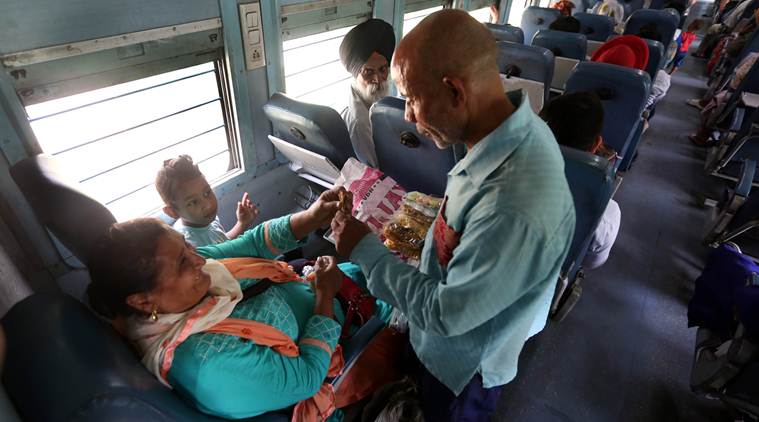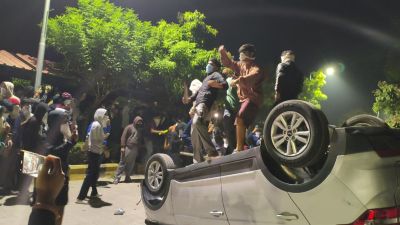“Green green matar khaao, Modi ke gun gaao… Santrey ki goli khaao, Smart City Ludhiana jaao… Kaali khatti goli khaao, Blackberry company ke maalik ban jaao… Laal-laal goli khaao, Lovely University mein jaao… (Eat green peas, sing Modi’s praises; eat orange candies, go to Smart City Ludhiana; eat black and sour candies, be the owner of Blackberry; eat red candies, go to Lovely University)…”

With almost all of them operating without permits, these hawkers often run the risk of getting rounded up during special drives by the Railway Protection Force. On June 1, the Railway Protection Force in Surat arrested a hawker after filing an FIR under several sections of the Railway Act, including for hawking and begging, “spreading nuisance or using abusive language in railway carriage” and for “unlawful entry into train,” among others.
Avdesh Dubey, the hawker, was arrested days after a video of him mimicking and mocking politicians, including Prime Minister Narendra Modi and Congress leaders Sonia and Rahul Gandhi, went viral on social media. While the Railways said Dubey was a “repeat offender” and had been caught several times for selling goods on trains without a licence, his arrest led to an uproar, with claims that he was targeted for mocking the PM.
 As Chander spots a child pestering his mother for candies, he sings, ‘Khatti meethi goli khao, Google ke scientist ban jao (Eat sweet-sour candies, be a Google scientist). (Express Photo by Gurmeet Singh)
As Chander spots a child pestering his mother for candies, he sings, ‘Khatti meethi goli khao, Google ke scientist ban jao (Eat sweet-sour candies, be a Google scientist). (Express Photo by Gurmeet Singh)
Chander says he feels for Dubey, calling it “injustice being done to poor”. “This shouldn’t have happened in Modi raj. Modi is a good boy… He is Made in India,” smiles Chander, who has studied up to Class 12.
Much like Dubey who used parody to draw customers, Chander sings self-composed jingles — featuring everything from Smart City to Blackberry, Google to Lovely Professional University and Ludhiana’s Clock Tower. But it’s Modi who features more often than anyone else.
“Aaj ke zamaane mein advertising ke bina kuch bikte dekha hai aapne (Have you seen anything getting sold without advertising these days)?” he says, adding that he is not scared about his jingles on Modi. “If I use the PM’s name and that gets me two meals a day, what is wrong with that? In fact, the poor will bless Modi,” says Chander, who calls himself a “a good salesman”.
Story continues below this ad
As he a spots a child pestering his mother for candies, Chander sings, ‘Khatti meethi goli khao, Google ke scientist ban jao (Eat sweet-sour candies, be a Google scientist).
His jingles now get more local, featuring names of private companies, tuition and coaching centres and wedding halls. “I have tied up with these companies and every time I sing about them, I get a commission. This gives some extra income,” he claims. He doesn’t disclose “the commission” and moves ahead to the next coach.
Jalandhar Cantonment station is just a few minutes away and that is where Chander will deboard and catch a train back to Ludhiana.
 Jalandhar Cantonment station is just a few minutes away and that is where Chander will deboard and catch a train back to Ludhiana. (Express Photo by Gurmeet Singh)
Jalandhar Cantonment station is just a few minutes away and that is where Chander will deboard and catch a train back to Ludhiana. (Express Photo by Gurmeet Singh)
“It is safer to get off at Jalandhar Cantonment because at the station after that, Jalandhar City, there will be policemen and extra checking. If I get caught, my next two working days will be wasted. Everytime we are caught, we have to do sewa of policemen or pay a bribe of at least Rs 500 to get away. Once they took away all that I had earned the entire day. And if I get arrested, I call my wife and she gets me released,” he says, adding that he has been caught at least five times in the past.
Story continues below this ad
A “Modi fan”, Chander, however, has a few complaints. “Modi has forgotten that he was a vendor like us and used to sell tea. Then why are we being stopped now,” he asks. But he is also hopeful. “I use Modi’s name while singing because he is an honest PM. I will soon write him a letter, asking him to legalise hawkers like me and issue us licences. We are ready to pay the licence fee. It will be even better if the government hires us and gives us a monthly salary. If such a day ever comes, I will write him a Thank You letter” he says.
Polio-stricken in his left leg and hand, Chander, who is from Khalilabad in Uttar Pradesh, has been living in Punjab since 1984. He claims he became a railway hawker after government officials demanded a bribe of Rs 5 lakh when he applied for the post of a stenographer under the handicap quota.
“Before calling us illegal, politicians should clean up the system. I did not choose to become a hawker. Where would I have got the Rs 5 lakh to bribe officials? I threw away my Class 12 certificate in anger. Now, I earn 500-700 a day. When I was in Class 4, my mother had gone around begging because she did not have Rs 10 to pay my school fee. At least I am not begging,” says Chander, who lives in Jalandhar city with his wife, in a room rented for Rs 1,500 a month.
Every day, he packs his lunch and leaves home at 7 am, getting back at 7 pm after making at least 15-20 trips a day between Ludhiana and Jalandhar. Once home, he prepares for the next day’s work — making small packets of toffees, candies and savouries that he buys from wholesale markets.
Story continues below this ad
Unable to ride a vehicle due to his disability, he walks around 6 km every morning from his home to Jalandhar City station and back. For the next 12 hours, Chander barely gets to sit as he walks from one compartment to another, carrying heavy bags. “I never board a train when it is moving. It is risky with my physical condition. But I have to walk between compartments and across tracks. All this is risky,” he says.
 Every day, he packs his lunch and leaves home at 7 am, getting back at 7 pm after making at least 15-20 trips a day between Ludhiana and Jalandhar. (Express Photo by Gurmeet Singh)
Every day, he packs his lunch and leaves home at 7 am, getting back at 7 pm after making at least 15-20 trips a day between Ludhiana and Jalandhar. (Express Photo by Gurmeet Singh)
It’s around 10.40 am and the train stops at Jalandhar Cantonment. Chander gets off the train and walks towards a “safe” spot on Platform Number 2 – a bench under a tree, where he sits down to have his first meal of the day. “Even if there is a good train approaching, I do not get up when I am eating. After all, aren’t we all working to fill our stomachs,” says Chander, taking a bite of his roti.
What are “good trains”? “Those on which I can make money. I do not get into AC chair coaches. Rich people there get offended. I also don’t get onto trains from UP and Bihar. No customers there… they don’t spend. My target customers are the middle-class who do not mind buying candies and biscuits,” says Chander.
The Gazipur Express stops and goes, but Chander is waiting for the Malwa Superfast Express to take him to Ludhiana. That’s a “good train”.

 Subhash Chander, who hawks his wares on running trains, wants the government to legalise hawkers like him and issue licences. (Express photo by Gurmeet Singh)
Subhash Chander, who hawks his wares on running trains, wants the government to legalise hawkers like him and issue licences. (Express photo by Gurmeet Singh)
 As Chander spots a child pestering his mother for candies, he sings, ‘Khatti meethi goli khao, Google ke scientist ban jao (Eat sweet-sour candies, be a Google scientist). (Express Photo by Gurmeet Singh)
As Chander spots a child pestering his mother for candies, he sings, ‘Khatti meethi goli khao, Google ke scientist ban jao (Eat sweet-sour candies, be a Google scientist). (Express Photo by Gurmeet Singh) Jalandhar Cantonment station is just a few minutes away and that is where Chander will deboard and catch a train back to Ludhiana. (Express Photo by Gurmeet Singh)
Jalandhar Cantonment station is just a few minutes away and that is where Chander will deboard and catch a train back to Ludhiana. (Express Photo by Gurmeet Singh) Every day, he packs his lunch and leaves home at 7 am, getting back at 7 pm after making at least 15-20 trips a day between Ludhiana and Jalandhar. (Express Photo by Gurmeet Singh)
Every day, he packs his lunch and leaves home at 7 am, getting back at 7 pm after making at least 15-20 trips a day between Ludhiana and Jalandhar. (Express Photo by Gurmeet Singh)





